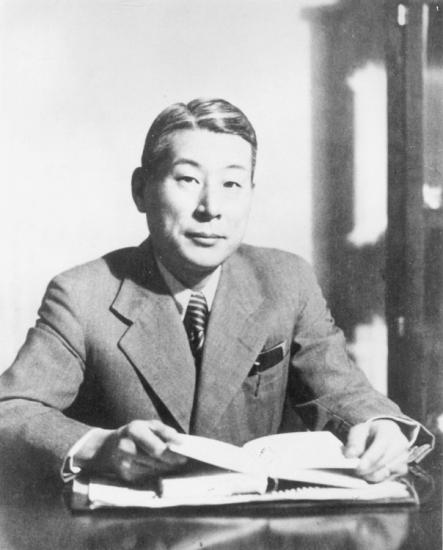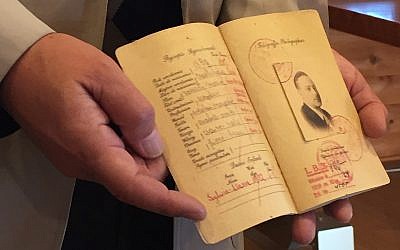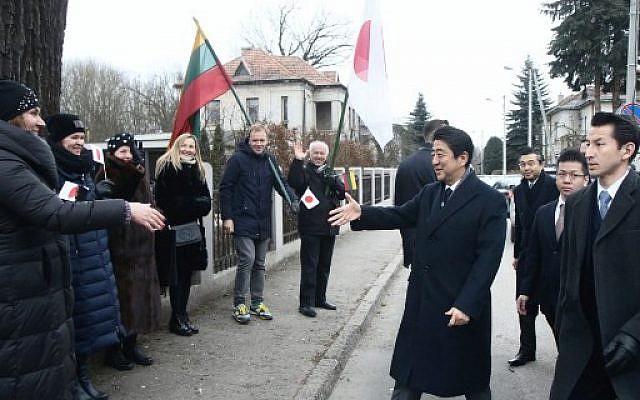Canada: 'One Is Too Many' : The Rescue of WWII Jews : Japan's Response, Chiune Sugihara, The Japanese Schindler
During the war years, the Jewish communities in the Far East living under the Japanese occupation - principally the 30,000 in Shanghai- but also small communities in other Chinese cities and throughout the Netherlands East Indies and Philippines - lived under an administrative policy that was noteworthy for its generally neutral attitude. (Another group lived in French Indo-China, but they were subject to Vichy's anti-Jewish laws and suffered removal from government positions and had prohibitions placed on their activities. Although a small number of Jews suffered maltreatment at the hands of individual Japanese officials, few were imprisoned or restricted because of their identity. In these latter cases, the Jews were singled out because they were stateless persons, having been stripped of their Polish or German citizenship by Nazi policy, and necessarily because they were Jews. Overall Japanese policy and actions towards Jews as a group was one that could be characterized as studied even-handedness. The Japanese did not single out the Jews for special attention or restrictions because of their “ethnic” or religious uniqueness. On the other hand, the Jews shared equally in the suspicion that the Japanese held for all neutral and non-Japanese nationals living within the Greater East Asian Co-Prosperity Sphere.
Jewish Virtual Library
Japan, During World War II, was part of the Axis group, along with Italy, led by Nazi Germany. While anti-Semitism was an add-on whereby Nazi Germany plotted out a complex plan of genocide to wipe Jews off the face of the earth, Italy's anti-Semitism was less toxic than Germany's though complicit, while Japan, despite being given honourary 'Aryan' status as a tripartite member of the Axis, failed to share the venom of anti-Semitism with its wartime allies. Japan admired what it felt was a mercantile and financial genius of the Jews and it also remembered how Jewish financiers helped it during the Russo-Japanese war.
When Jews were desperate to escape Europe and the fascist hounds slavering for their slaughter, Japan was not averse to allowing Jews to enter Japan, to be settled in Japanese-occupied China where they had safe haven during the war years. At the same time the situation had changed when Japan brutally occupied Korea and China, committing mass atrocities of unspeakable brutalities and Jewish human rights groups particularly in the United States, condemned Japan, leading to Japanese suspicion of Jewish activities inimical to Japanese interests.
And then there was the action of one Japanese man, a diplomat, Shiune Sugihara, who, as vice-minister of the Foreign Affairs Department for Japan in Manchuria in 1934, resigned his position to protest the agonies of China under Japanese occupation. In 1939 Mr. Sugihara was posted to Lithuania to head the Japanese consulate there. Once there, his first-hand experience in viewing the plight of desperate Jews hoping to escape the bleak threat descending upon them in German-occupied Poland, cabled his embassy for permission to issue visas to the refugees.
"Concerning transit visas requested previously .. stop .. advise absolutely not to be issued any traveler not holding firm end visa with guaranteed departure ex Japan .. stop .. no exceptions .. stop .. no further inquiries expected .. stop."
Cable, E. Tanaka, Foreign Ministry
"I told the Ministry of Foreign Affairs it was a matter of humanity. I did not care if I lost my job. Anyone else would have done the same thing if they were in my place."
Japanese Diplomat Chiune Sempo Sugihara
 |
| Japanese diplomat Sugihara Chiune, who helped save the lives of thousands of Jews as the Imperial Consul to Lithuania in World War II. (Public domain via Wikimedia Commons) |
"[My father was] a very simple man. He was kind, loved reading, gardening and most of all children."It was, however, unusual. Not excessively rare -- since there are others who during that dread period of history when Jews were systematically exterminated during Nazi Germany's 'Final Solution' -- but highly unusual that a family man with children whose diplomatic mission was to represent the best interests of Japan and certainly didn't include the embrace of a mission to save as many condemned-to-death people, perfect strangers of a different ethnic group and religion, as he could manage. Yet this is precisely what Mr. Sugihara set out to do.
"He never thought what he did was notable or unusual."
Nobuki Sugihara
He conferred with his wife and with their children before undertaking his selfless mission. And knowing his actions would result in losing his professional credentials, his employment and his and his family's financial security, he undertook to defy his government's edict that no visas were to be handed out. "We had thousands of people hanging around the windows of our residence. There was no other way", he explained during an interview that took place in 1977. "A lot of it was handwriting work", he said, in the issuing of the visas.
He dedicated himself at all hours of the day to writing visas, issuing the same number of visas in one day that would normally be issued in an entire month. Yukiko, his wife, took to massaging his hands at night, attempting to relieve the ache from continual focus on writing those endless visas. Japan closed its embassy in September of 1940, whereupon Mr. Sugihara took possession of its stationery and simply went on writing visas with no legal standing, but which succeeded regardless since the seal of the Japanese government was stamped on them, alongside his name as consul.

In Yaotsu, Japan, in November 2017,
Chiune Sugihara Memorial Hall museum director Daisaku Kunieda holds a
visa replica of one of the Jews who had a transit visa stamped by
Sugihara. (Amanda Borschel-Dan/Times of Israel)
An estimated 6,000 visas were issued, enabling Jews to travel through Japan to other destinations, sometimes entire families travelling on a single visa. Over 40,000 Jews are considered to owe their lives today resulting from the determination and humanitarian impulse of this man of honour and compassion. With the closure of the consulate it was time to leave. The consulate stamp was handed over to a refugee by Mr. Sugihara, with the advice to continue forging more visas, and as he himself left, he tossed visas from the train window to refugees standing on the platform.
Mr. Sugihara was dismissed from the foreign office. He worked at menial jobs. A survivor, Yehoshua Nishri, who had been a teenager in Poland who survived the war thanks to one of Mr. Sugihara's visas and who had in 1968 been dispatched himself as a diplomat to Tokyo at the Israeli embassy, tracked him down. In those intervening years there was no word spoken of wartime horrors and few knew Mr. Sugihara's history as a saviour of Jews marked for death. Until Mr. Nishri revealed his contribution and Mr. Sugihara was hailed by Israel as one of the 'righteous among the nations'.
 |
| Japan's Prime Minister Shinzo Abe arrives at the Sugihara House in Kaunas, Lithuania, on January 14, 2018. (AFP Photo/Petras Malukas) |
Labels: Chiune Sugihara, Europe, Holocaust, Japan, Nazi Germany, World War II
0 Comments:
Post a Comment
<< Home